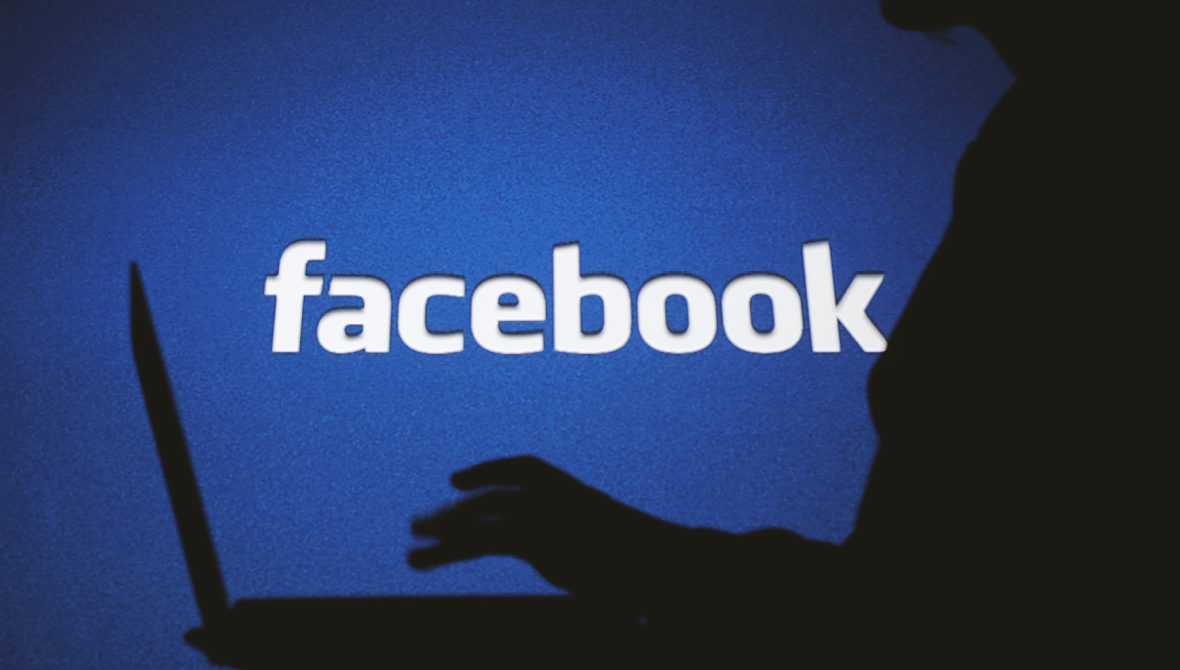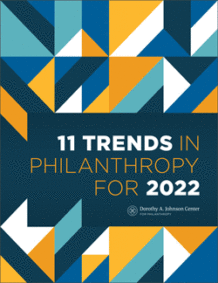Nonprofits Are Questioning Their Use of Facebook


 This article was first published in our 11 Trends in Philanthropy for 2022 report. Explore all 11 trends in the full report.
This article was first published in our 11 Trends in Philanthropy for 2022 report. Explore all 11 trends in the full report.As the world’s largest social media platform, Facebook has changed not only the way people connect and interact with one another but the way nonprofit organizations engage their donors and stakeholders as well.
However, the recent testimony before Congress from Facebook whistleblower Frances Haugen confirmed what many suspected for some time — that Facebook is well aware of the harm its products cause, yet continues to pursue questionable data collection practices and optimize an algorithm that amplifies the spread of misinformation (Allyn, 2021). As we learn more about how Facebook and other social media platforms are causing harm to civil society, philanthropic organizations are starting to ask themselves a difficult question: should we stop using Facebook (Levey, 2020)?
With over 2.9 billion monthly active users worldwide (Statista, 2021), Facebook provides enormous value to nonprofits as an avenue for awareness-building, community engagement, and, of course, fundraising. Facebook says it has helped raise more than $5 billion for nonprofit and private causes since 2015, the year it began facilitating online donations (The NonProfit Times, 2021).
But despite its fundraising capabilities, Facebook is, at its core, an advertising platform; as much as 99% of its revenue comes from advertising (Edelman, 2020). The more its users engage, the more data it can mine and monetize. There’s legitimate concern across our sector that Facebook promotes its work with nonprofits purely as a way to mine donor data — another opportunity to collect and sell more information (Fontelera, 2021).
“[Facebook’s] fee-free fundraising options appeal to nonprofits looking to save on donation processing costs, but that convenience comes at the high cost of donors’ privacy and data.”
Mightycause CEO Tom Matthews (2019) highlighted how the company’s fee-free fundraising options appeal to nonprofits looking to save on donation processing costs, but that convenience comes at the high cost of donors’ privacy and data.
When someone likes a post, clicks on a link, or contributes to a fundraiser on a nonprofit page, Facebook stores that data — anything and everything from the individual’s demographics, social networks and relationships, political leanings, life events, food preferences, hobbies, and entertainment interests, to the digital devices they use (Hitlin & Rainie, 2019) — and uses it to sell to advertisers and target solicitations on Facebook and its other applications, including Instagram and WhatsApp.
Nonprofits have expressed other concerns about Facebook, as well. Richard Levey (2020) described how Facebook has frustrated some nonprofit leaders by falsely censoring their messages for being “political statements” (based on its own, unclear screening criteria) and, thus, thwarted their organizing efforts. Other organizations find that they aren’t able to promote, or “boost,” their messages because of Facebook’s algorithm, meaning a nonprofit might miss out on organizing or fundraising opportunities when attempting to address time-sensitive issues.
Haugen’s testimony has accelerated a phenomenon that was already happening on a smaller level. As far back as 2010, there were public calls for users to leave Facebook (Warren). The group behind the now-defunct website QuitFacebook.com explained, “If you agree that Facebook doesn’t respect you, your personal data or the future of the Web, you may want to join us” (Smith, 2011, para. 6).
The ongoing Facebook Logout campaign, organized by the tech accountability group Kairos, calls on Mark Zuckerberg to step down as CEO of Facebook, demanding that the company prioritize data privacy, tackle disinformation and misinformation, and provide transparency on content moderation decisions (2021).
In October 2021, a coalition of nearly 50 nonprofits in the U.S. launched a movement to draw attention to the dangers of apps like Facebook, whose algorithm “use[s] our own personal data to manipulate us” (HowToStopFacebook.org, para. 1; Jackson, 2021). They argue that these platforms are harmful to children, undermine democracy, and exacerbate discrimination. The group’s website, HowToStopFacebook.org, prompts visitors to sign a petition asking lawmakers to investigate Facebook and pass more stringent data-privacy legislation.
Some nonprofits have already stopped using Facebook entirely. Portland, Oregon-based tech nonprofit NTEN announced its departure from Facebook in June 2020 (Sample Ward). And late last year, Momentum Nonprofit Partners posted a message on Facebook saying, in part, “After careful review of our mission and values, we have determined that Facebook does not align with our values as an organization and our commitment to creating positive change in our community” (2021).
A growing number of for-profit businesses have suspended their paid advertising on Facebook as part of the #StopHateForProfit campaign, organized by a coalition of civil rights organizations including the Anti-Defamation League (ADL) and the NAACP. Patagonia, The North Face, REI, Upwork, and others joined the boycott amid concerns that Facebook continues to be “complicit in spreading disinformation and fomenting fear and hatred,” (Fung & Kim, 2020, para. 5). “We hope this campaign finally shows Facebook how much their users and their advertisers want them to make serious changes for the better,” said ADL CEO Jonathan Greenblatt (Fung & Kim, 2020, para. 12).
While it’s clear there is increasing interest in moving away from Facebook, what isn’t clear is what might take its place. A platform with the same functionalities and reach does not currently exist, which will make leaving the platform a difficult choice for many nonprofits (Levey, 2020).
Those that use Facebook to interact with donors and are heavily reliant on its fundraising capabilities will have the hardest time shifting away from Facebook. “Smaller organizations are … more severely impacted by the inability to reach back out to the donors who are giving via Facebook, because they really need them,” said Elyse Wallnutt, director of strategy at Media Cause (Levey, 2020, para. 16).
“[Nonprofits] that use Facebook to interact with donors and are heavily reliant on its fundraising capabilities will have the hardest time shifting away from Facebook.”
With the announcement of Meta, the new parent brand of Facebook, the company stated that Meta’s focus will be to “bring the metaverse to life and help people connect, find communities and grow businesses” (2021, para. 1). Nonprofits, broadly, exist to serve the same purpose — to help communities thrive for the greater good. Yet in that same announcement about the future of the company, Facebook/Meta clarified that their corporate structure would not be changing, nor would the ways they collect and share data.
There’s no question that Facebook will have the resources to support the development of Meta’s vision — but an increasing number of nonprofits are questioning whether they want to take part in that future.


Allyn, B. (2021, October 5). Here are 4 key points from the Facebook whistleblower’s testimony on Capitol Hill. NPR. https://www.npr.org/2021/10/05/1043377310/facebook-whistleblower-frances-haugen-congress
Edelman, G. (Oct. 5, 2020). Ad tech could be the next Internet bubble. WIRED. https://www.wired.com/story/ad-tech-could-be-the-next-internet-bubble/
Fontelera, K. (Oct. 21, 2021). Why nonprofits are leaving Facebook [Web log]. NonProfit Pro. https://www.nonprofitpro.com/post/why-nonprofits-are-leaving-facebook/
Fung, B. & Kim, A. (June 22, 2020). Patagonia joins growing Facebook advertiser boycott over the site’s failure to stop ‘hateful lies and dangerous propaganda’. CNN. https://www.cnn.com/2020/06/22/tech/facebook-boycott-hate-trnd/index.html
Hitlin, P. & Rainie, L. (Jan. 16, 2019). Facebook algorithms and personal data. Pew Research Center. https://www.pewresearch.org/internet/2019/01/16/facebook-algorithms-and-personal-data/
Howtostopfacebook.org. (n.d.).
Jackson, S. (2021, October 13). A group of nearly 50 nonprofits has launched a campaign to ‘effectively end Facebook’s current business model’ in the wake of whistleblower testimony. Business Insider. https://www.businessinsider.com/dozens-of-nonprofits-how-to-stop-facebook-frances-haugen-testimony-2021-10
Kairos Fellowship. (2021, September 22). Kairos calls on millions of coalition members to log off Facebook to demand the company stop profiting off racism and hate [Press release]. https://www.kairosfellows.org/news/2021/9/23/kairos-calls-on-millions-of-coalition-members-to-log-off-facebook-to-demand-the-company-stop-profiting-off-racism-and-hate
Levey, R. (June 9, 2020). Nonprofits mull leaving Facebook amid multiple concerns. The NonProfit Times. https://www.thenonprofittimes.com/technology/nonprofits-mull-leaving-facebook-amid-multiple-concerns/
Matthews, T. (April 29, 2019). Facebook fundraising hurts nonprofits: How, why, and what to do about it, from Mightycause’s CEO [Web log]. Mightyblog. https://blog.mightycause.com/facebook-fundraising-hurts-nonprofits/
Meta. (2021, October 28). Introducing Meta: A social technology company. https://about.fb.com/news/2021/10/facebook-company-is-now-meta/
Momentum Nonprofit Partners. (2021, October 14). Hi Friends! We wanted to let you know that Momentum Nonprofit Partners will no longer be actively posting on Facebook. Facebook. https://www.facebook.com/MomentumNonprofit/
Sample Ward, A. (2020, July 2). NTEN says goodbye to Facebook. NTEN. https://www.nten.org/article/nten-says-goodbye-to-facebook/
Smith, C. (2011, May 25). Delete your Facebook account: ‘Quit Facebook Day’ wants users to leave. Huffpost. https://www.huffpost.com/entry/delete-facebook-account-q_n_576956
Statista. (2021). Number of monthly active Facebook users worldwide as of 2nd quarter 2021. https://www.statista.com/statistics/264810/number-of-monthly-active-facebook-users-worldwide/
The NonProfit Times. (March 29, 2021). Facebook-generated fundraising hits $5 billion since inception [Web log]. https://www.thenonprofittimes.com/fundraising/facebook-generated-fundraising-hits-5-billion-since-inception/
Warren, C. (June 1, 2010). ‘Quit Facebook Day’ falls flat. Mashable. http://www.cnn.com/2010/TECH/social.media/06/01/quite.facebook.day.falls.flat.mashable/index.html